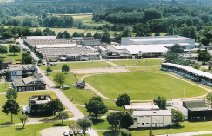Rural anger at high-speed rail link

A proposed high-speed rail link will run through the National Agricultural Centre at Stoneleigh, even though other parts of the route have been redrawn.
The HS2 route between London and Birmingham will bisect the Warwickshire site, according to a revised map published by the government.
Transport secretary Philip Hammond said he recognised there would be some opposition to the proposed route and its impact on the countryside.
But the rail link had huge potential to reshape the country’s “economic geography” for the better, he added.
“High speed rail is so important because it has the potential to transform the way Britain works and competes in the 21st century.”
Mr Hammond said he had made a number of changes to the route published by the previous Labour government.
The revised route differed from previous rail link proposals for about 65 of its 127 miles, he said.
“We are continuing to look at additional mitigation measures to lessen the impact of the line on those communities which it passes nearest.”
The government was also considering ways of providing assistance to those who may be affected by the rail link, said Mr Hammond.
Depending on public consultation and parliamentary approval, work on the London Birmingham rail link will start in 2015.
But rural opposition to the scheme remains strong.
The Countryside Alliance said the government had failed to reassure communities affected by the line.
Nor had ministers made the business case for HS2.
The proposed route would fundamentally damage some of the most picturesque countryside in Britain, said alliance chief executive Alice Barnard.
“Despite rural people being most affected by the proposed HS2 route, communities living in the countryside will see no local benefits.
“There are no proposed stations outside London and Birmingham.
“This confirms that high speed rail travel will be accessible for people living in urban areas but the impact felt by those living in the countryside.:
The project needed to be reappraised from an economic, social and environmental perspective, said Ms Barnard.
“At a time when we are seeing 20% cuts to most departmental budgets, it is certainly not a time to be spending billions of pounds on an unsound project.”
